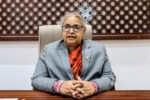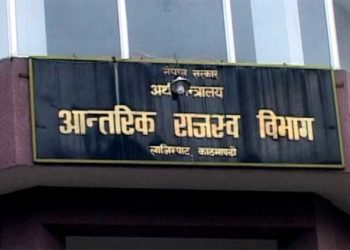KATHMANDU: In the wake of an unprecedented global health crisis posed by a coronavirus, almost every sector has seen severe dent. From a person’s behavior to community activities and State affairs, the coronavirus threat is evident.
Journalism, which works in the forefront, is undoubtedly facing hard times.
With the cases of coronavirus found positive among some journalists in Nepal of late, the shock wave has run high among fellow journalists and media houses too.
The media which have already witnessed a tremendous decline in news reporting, coverage, advertisement, and circulation with the enforcement of lockdown since March 24, are again anxious over their future. Similarly, editors and media analysts are projecting the bleak future of print journalism.
The closure of hundreds of media has been reported from the States. Print media has suffered worst in the crisis.
The recent exponential growth of coronavirus has further created uncertainty in media, especially the small media and those run from the places out of the federal capital.
“We’ve stopped publishing the daily newspaper since March 24. Although we tried to ensure continuous update on its online edition, we have not been able for it as well.” It was what Bikram Niraula, editor of the Udghosh daily published from Biratnagar city of State-1, said during a program today.
According to him, nearly 30 daily and more than 70 weekly newspapers published from State-1 are closed and news bulletins declined heavily in 100 FM radios. There is mounting uncertainty in media and journalists both, he added.
Need of safety material, relief package
In a video conference held by Freedom Forum today, journalist Rajan Singh from Janakpur city shared similar plight that more than 60 percent journalists are jobless in State-2.
Information receiving is being increasingly difficult with the fear of coronavirus among public officials. “People are now changing perspective towards journalists because some journalists are tested positive to coronavirus here recently.”
He argued as many journalists are home quarantined, there are no more public interest reporting except COVID-19. Singh said journalists are in desperate need of safety materials and relief package.
According to journalist Rajan Upadhyay, almost 90 percent of print media is closed in Gandaki State. Although some online media have tried to make news by interviewing experts via Zoom, many issues are underreported. Journalists are home quarantined and stopped reporting fearing COVID-19.
Journalist Ashok Dahal from Kathmandu Valley viewed that violations against journalists were growing in the wake of a crisis, which has further discouraged reporters. He, however, said the crisis has been an opportunity for journalists to utilize technology.
“The media houses in the Kathmandu Valley as well have witnessed tough time to run media in full scale- many stopped publication, some are publishing in the gap and cutting down pages and weeklies almost closed. It has a direct bearing on working journalists,” he said, adding that it is because of a harsh decline in an advertisement in media.
Sudeep Gautam, Journalist in State-5, said he had helped the fellow journalists in crisis by providing sanitizers and soap to 50 journalists in Dang district. “I worked together with the FNJ here and provided safety materials to the journalists by urging a small industry for the production.”
When asked what the Federation of Nepali Journalists (FNJ) is doing at this crisis, FNJ General Secretary Ramesh Bista said, “FNJ has drawn government’s attention to launching special programs focused journalists’ safety and sustainability of media.
A relief package was needed for journalists and small media houses. Nearly 400 journalists have undergone PCR tests across the country so far, and the government is urged to increase test among journalists.”
The General Secretary, however, expressed worry over nothing mentioned in the government policy and programs for the safety of journalists in this crisis.
He further reminded that the media houses must be cooperative to assuage the plight- they need to provide salary and safety materials to the working journalists.
Save journalists, save journalism
When it comes to media sustainability, some analysts project uncertain and bleak future of Nepali journalism and stress on saving journalists in crisis.
Executive Chief of Freedom Forum, Taranath Dahal observed, “Nepali media is suffering unexpected crisis as other sectors. Although community media and radio are comparatively effective in a crisis, other media are badly affected, thereby depriving citizens of their right to information and dearth of public interest reporting. State-run media are financially stable.
As media will see chain effects, print media is likely to suffer worst following the crisis.” Also the former President of FNJ, FF Executive Chief Dahal reminded that nearly 400 to 500 excellent journalists left the profession due to decade-long insurgency in Nepal.
He stressed the need to retain journalists to keep intact the watchdog role of journalism in society.
Editor at Centre for Investigative Journalists, Shiva Gaunle seconds Dahal saying, “Though print media still has aura and impact in Nepali readership, its future entirely depends on revenue which is certainly hit hard with economic disarray.”
He said Nepali journalists are in a quite vulnerable situation at present. They need to be safe first then do journalism, he suggested, cautioning against wrong work style and carelessness. According to him, uncertainty in the media depends on how long the crisis continues.
Journalist from Hetauda city, Rammani Dahal, said the government could increase the health-related advertisements in a bid to prop up local media, because restoration of local media may be difficult even after the crisis.
“I think the investors in media may think for online media, shifting attention from print media after a crisis,” he projected.









Comment